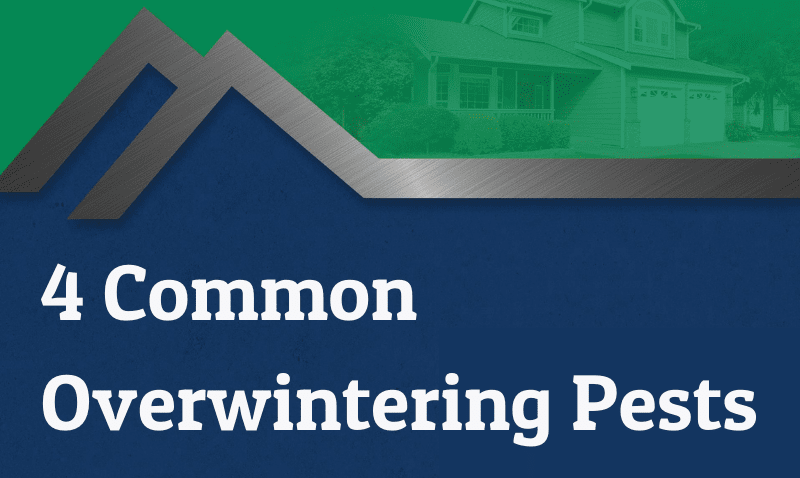
Overwintering Pest Identification & Prevention
Now that the temperatures are beginning to cool down and our area has experienced a few overnight freezes, you may think the bugs and pests are gone for the year. This may be true for a small fraction of pests; however, other species of pests may survive through cold temperatures. This is called overwintering.
What is an overwintering pest?
Overwintering is a term used to describe anything that can live through the cold temperatures of winter. Many types of plants, animals, insects, and rodents overwinter.
Where do the other bugs go in winter?
Some bugs migrate south for the winter to avoid cold temperatures. Others will hide and wait out the temperatures–some species of aquatic insects will stay at the bottom of ponds, and other bugs burrow deep in the soil. Other species enter a form of hibernation called diapause. In diapause, insects’ metabolism slows down to help preserve nutrients throughout the winter. Their development pauses, and they essentially freeze where they are and stay there until spring.
Do I need winter pest control?
Several pests species have natural adaptations that allow them to survive the winter, but many may survive by coming into your home for food and warm shelter.
Arkansas Pests You May See This Winter

Some common pests in our area you may see in or around your home this winter include:
- Cockroaches can trigger allergies and aggravate asthma in young children.
- Mice and rats can cause major damage to electrical systems in your home as they chew through wires or walls in search of food and shelter.
- Raccoons may make their homes in your attic or chimneys to wait out cold weather.
- Spiders typically hide in dark corners of your home, attic, or garage. Check any boxes you’re pulling out of storage for hidden stowaways.
- Fleas’ sources of food dwindle in the winter, which causes many to hide indoor or dogs, cats, and other pets to try and ride out the winter. Getting rid of fleas in the winter can be even more challenging since many homeowners keep their animals inside more often in colder weather.
- Tree squirrels may hide out in your attic to avoid the cold weather.
Signs You Have a Pest Problem
Even with the best prevention techniques, insects and rodents can still get into your home. The best thing you can do is look for signs that they have come into your home. Here are some common signs you have pests in your home:
- Dead bugs indoors
- Droppings
- Odd, musty smells
- Shed exoskeletons
- Nests or webs
Pests may seem to disappear in the blink of an eye when the temp starts to drop. However, the big issue with insects and rodents overwintering in your home is that you may not even notice that they are there. In fact, many people believe that their pest problem is gone just because they are not seeing them.
Prevent Pests in Your Home This Winter
Even though you may not see these pests until they make their presence known in the spring, it doesn’t mean they aren’t there. It’s important to take as many preventative steps as possible to keep them out of your home in the cooler months.
We recommend taking advantage of exclusion techniques such as caulking cracks and crevices and sealing any openings around windows and doors. Some other winter pest-proofing techniques include:
- Inspect and seal openings around your chimney
- Replace screens covering vents and any outside attic openings
- Clean out gutters to prevent nesting and feeding areas
- Keep your home tidy and clutter-free
- Don’t leave your pet’s food and water bowl out overnight
Just because you don’t see them doesn’t mean that they are not there. Don’t let your home become a winter vacation destination for pests and rodents. If you see or suspect bugs or rodents to be hibernating in your home for the winter, give us a call today.
Hopper Termite & Pest Can Solve Your Winter Pest Problem
Our trained technicians will carefully inspect your home or business for signs of entry and hibernation. From there, we can put together a plan to get rid of any troubling insects or rodents so that you don’t have a major infestation when warmer temperatures come back around. Don’t wait! Give our team a call today at (870)425-4122.
